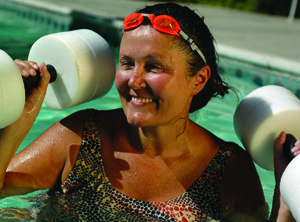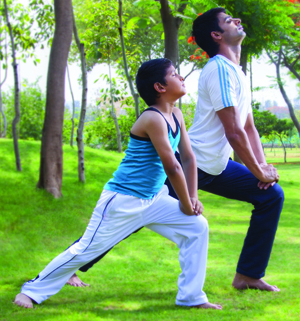Part III: Healthy Living with Progressive MS
Avoiding Comorbidities that Drive the Disease Faster
 The risk of physical disability in MS is increased when people with MS develop additional medical conditions. For example, two modifiable risk factors for developing comorbidities that can accelerate the disease include smoking and obesity.
The risk of physical disability in MS is increased when people with MS develop additional medical conditions. For example, two modifiable risk factors for developing comorbidities that can accelerate the disease include smoking and obesity.
People with MS should not start smoking and should quit smoking if they are using tobacco. It is well known that smoking can lead to heart disease, lung disease, and stroke, but it’s important for the MS community to understand that smoking accelerates the course of MS. Smoking leads to a faster rate of worsening in neurologic function (increasing EDSS score), an increase in bright lesions (those with inflammation) on MRI, and faster rates of brain atrophy (loss of cells).
People with MS are also at an increased risk to gain excessive weight, often because they are limited in their mobility. Carrying extra weight, however, makes walking on shaky legs much harder. Extra weight can also affect other disease outcomes. Therefore, avoiding or treating obesity is an important goal in MS care. Working with registered dietitians, practicing portion control, and other “defensive dieting” behaviors, along with daily exercise, all help these efforts. In addition, surgical procedures, such as gastric banding, have been found to be safe and effective in helping morbidly obese individuals with MS to lose weight.
Avoiding Complications from Progression
Progression and worsening of the neurological status can in some cases lead to severe complications. For individuals who have advanced disease with little mobility, lack of limb movements can result in both contractures – joints that don’t bend – and decubitus ulcers, commonly referred to as bed sores. For these reasons, it is imperative that less-mobile individuals are frequently repositioned in their bed or chair, participate in stretching programs to remain limber, and have dependent areas of the body, such as heels, buttocks, and back, visually inspected for sores.
Similarly, individuals with progressive MS may be at risk of urinary retention, which is the incomplete emptying of the bladder, and recurrent urinary tract infections (UTIs). Unchecked, these can potentially develop into severe infection and urosepsis (a potentially severe reaction to a bacterial infection of the urinary tract). To avoid this, individuals with MS should promptly report any urinary concerns, such as foul-smelling urine, burning, or double voiding (when one urinates a second time within minutes of voiding initially). Tests to help diagnose bladder problems include urinalysis and bladder ultrasounds, often available at a doctor’s office.
Additionally, progression can at times compromise swallowing and result in aspiration pneumonia, which again risks developing into a severe infection. To avoid this, individuals with MS and families should promptly report any choking or coughing while eating or drinking. Speech pathology assessments and swallowing studies can help diagnose these problems. Speech pathologists can also help patients change the consistency of foods and liquids, as well as adopt various techniques for swallowing more safely.
Individuals with advanced progressive disease are also at risk for other physical, emotional, and psychological issues. Family members and individuals with MS need to discuss any changes or concerns with an MS specialist. This will help to minimize these risks and to provide proper strategies to help cope with the long-term challenges of progressive MS.
Discussing Progression with a Healthcare Provider
Individuals need to follow-up with their neurologist or MS specialist for periodic evaluations. A physician will recommend how often someone should be seen, and this may range from every three months to once per year, based on a person’s symptoms and needs.
Individuals should bring a list of their symptoms with them to their appointments. These should include any changes that are noticed in daily life in terms of physical symptoms or changes in memory and cognition. Bringing a list of these symptoms will help to not only ensure that all questions are answered during the visit, but also ensure that no questions are forgotten while speaking to the doctor.
Addressing what can be done to lessen MS symptoms is important. Symptom management has shown significant benefit in improving quality of life. Most symptoms of MS can be lessened with the following treatment strategies: medical treatment; physical, occupational, and/or speech therapy; exercise; counseling; and working with a support team comprised of family, friends, and healthcare providers, as well as religious or spiritual representatives, if appropriate.
Following up with a primary-care physician for regular medical care is also important. By doing so, individuals may avoid developing other medical conditions that can make living with MS more difficult.
Strategies for Wellness with Progressive MS
► Exercise
Exercise is key in maintaining function in people with MS. It should be considered as important as other medical interventions for the management of MS. Exercise has shown positive effects on walking speed, endurance, and aerobic capacity in MS. People with MS at almost any level of physical ability can work with a PT and OT to develop an exercise plan that is safe and can help to maintain their current level of functioning.
Exercise has also been demonstrated to lower stress and improve mood, energy, physical health, and overall wellbeing. A combination of a stretching program and aerobic exercise is recommended. Wellness programs are being developed across the country to promote exercise, healthy habits, and overall wellbeing.
 Aquatic exercise is a good option for many individuals with MS. Research on individuals with MS suggests that aquatic exercise is effective for improving flexibility and range of motion, cardiovascular endurance, fatigue level, muscle strength, mobility function (including gait and balance), quality of life, and psychological wellbeing. In addition, no exercise study reviewed has identified an increase in relapses or reported any other adverse change in neurologic status.
Aquatic exercise is a good option for many individuals with MS. Research on individuals with MS suggests that aquatic exercise is effective for improving flexibility and range of motion, cardiovascular endurance, fatigue level, muscle strength, mobility function (including gait and balance), quality of life, and psychological wellbeing. In addition, no exercise study reviewed has identified an increase in relapses or reported any other adverse change in neurologic status.
The aquatic environment offers numerous techniques and options for exercise participation with all levels of physical abilities. Whether someone is interested in a high-level aerobic workout, moderate cardio/strength training, or gentle, slow-moving form, aquatic exercise can be adapted to all levels of MS and provide a wide variety of safe, effective, and enjoyable ways to exercise.
 Yoga may be especially beneficial, as it releases muscular tension, improves flexibility and circulation, helps with balance and fatigue, and boosts mental alertness. Yoga is a gentle form of exercise, and since it may help to promote more energy than it requires, some find it to be an ideal exercise for those whose energy is limited from MS. By involving sustained muscle stretches, yoga may help to reduce spasticity by encouraging muscle relaxation. Additionally, because yoga encourages muscle groups to work together, it is thought to help with impaired coordination and balance.
Yoga may be especially beneficial, as it releases muscular tension, improves flexibility and circulation, helps with balance and fatigue, and boosts mental alertness. Yoga is a gentle form of exercise, and since it may help to promote more energy than it requires, some find it to be an ideal exercise for those whose energy is limited from MS. By involving sustained muscle stretches, yoga may help to reduce spasticity by encouraging muscle relaxation. Additionally, because yoga encourages muscle groups to work together, it is thought to help with impaired coordination and balance.
Another good exercise option is tai chi. This is a form of martial arts that uses slow movements and deep breathing to promote a type of “moving meditation.” It is a gentle, mind-body exercise designed to rebalance the body’s capacity for healing. Improved flexibility and balance control are among the many benefits of tai chi.
A study was conducted at the Texas Woman’s University in Dallas to determine the effects of tai chi on different factors involved with balance and gait in people with MS. Using several scales to measure the effects of tai chi, participants experienced improvements in balance, endurance, and strength. In addition to a decrease in perception of fatigue, significant improvement was also seen in fatigue severity.
Mindfulness has enormous potential for people with MS, where uncertainty for the future can often lead to increased stress and anxiety. This is a cognitive technique that focuses on teaching people to approach stress and life challenges in a different way. The goal of mindfulness is to teach individuals to stay fully in the present, without added judgment or assumptions about their present or future situations. It was originally developed for people with cancer and chronic pain and has been shown to significantly decrease anxiety, depression, and stress in these and many other conditions.
Individuals are strongly urged to consult their physician prior to the start or change of any exercise program or routine.
► Diet
Maintaining good general health is very important for people with MS. A healthy, well-balanced diet can assist in this goal. Different diets have been proposed as treatments, or even cures, for the signs and symptoms of MS. Most all of these diets, however, have not been studied in rigorous, well-controlled clinical trials, and the few that have been studied have yielded mixed or disappointing results. In fact, some special diets might be harmful, due to toxic amounts of certain vitamins or lack of other key nutrients.
For this reason, individuals with MS need to discuss dietary plans with their MS provider before embarking on any given new diet. Although no specific “MS diet” has been universally accepted by the medical community, what and how one eats can make a difference in important issues such as energy level, bladder and bowel function, and overall health. MS specialists often recommend that people with MS consider a low-fat, high-fiber diet, such as that recommended by the American Heart Association.
Several well-known diets are available for individuals with certain goals in mind, such as losing weight, improving health, or reducing the risk of developing other conditions, such as diabetes and heart disease. Doctors agree that eating a healthy diet to promote general wellness and prevent certain other medical conditions could potentially have a positive impact on MS and its symptoms.
Reducing salt intake may also be of benefit to individuals with MS. An array of recent research ranging from molecular studies to animal models and even some preliminary human data, has implicated levels of dietary salt – sodium chloride, or NaCl – as potentially affecting MS outcomes. In one study, higher-salt consumption was associated with increased clinical and MRI disease activity in people with MS. Seventy patients with RRMS were followed over two years, tracking sodium intake. This was in conjunction with clinical and MRI assessment every three-to-six months or at the time of relapse. Researchers found that individuals with high-sodium intake had 3.4-times greater odds of developing a new lesion on MRI, and on average, had eight more T2 lesions on MRI. MS relapse rates were higher among those with high-sodium intake.
► The Microbiome and MS
In recent years, researchers have found that interactions between a person’s microbiome and his or her immune cells may contribute to the development and severity of many disease states – including MS. The microbiome refers to the many millions of bacteria that reside in a person’s body, with current research focusing mainly on the bacteria that live in the intestines. Specifically, researchers have hypothesized that imbalances in the number or types of different strains of bacteria could potentially cause the immune system to be inappropriately activated to develop an autoimmune disease. Multiple groups are currently conducting research on the microbiome and its potential connection with MS.
Adjusting to Change
As lifestyle, preferences, and abilities evolve, people often must adapt to these changes. However, learning techniques to help cope with change, and learning new skills to better participate in activities for either work or pleasure, are all part of personal growth and can greatly enhance one’s quality of life. In the two sections to follow, guided imagery and vocational rehabilitation are described. These are just two examples of how one can adjust to his or her changing abilities and environment, and enable him or her to discover new ways to continue enjoying a productive and satisfying lifestyle.
► Guided Imagery
We often hear about the mind-body connection in regard to our health and wellbeing. Many Western-trained physicians and researchers are discovering that the mind appears to have a powerful influence over one’s physical and emotional health, a concept long held by those who practice Eastern Medicine. In recent years, a technique known as guided imagery has been gaining much recognition by individuals, families, care partners, and health professionals.
Research is showing that through guided imagery, biophysical and biochemical changes may take place within the body bringing about physical, emotional, and mental benefits. In general, these types of changes include:
- Mood may be improved, by calming, relaxing, inspiring, and motivating
- Depression and anxiety may be reduced
- Intuition, creativity, and performance may be increased
- Blood pressure may be lowered
- Blood sugar may be reduced
- Immune functioning may be improved
- Surgical wounds may heal more quickly
- Pain and headaches may be lessened
- Negative reactions to medications or treatments may be reduced
- Pre-surgery fears may be lessened
Guided imagery requires a state of deep relaxation, and adds the component of a gentle direction for your sensory images. A healthcare professional trained in the area of guided imagery may use a script to first help you to relax, and then he or she may give you a topic to imagine – such as a favorite place to visit, a loved one you would like to see, or possibly envisioning yourself accomplishing an important goal. In more advanced sessions of guided imagery, patients may learn to imagine specific cellular changes going on in their body to help fight disease, or they may return to a specific traumatic event to recall details and find closure.
Seeing a healthcare professional to participate in guided imagery is just one option; guided imagery dialogues are also available on CD, as well as in books. Some therapists may give guided imagery sessions over the phone or record an individualized CD for a client. Group sessions or workshops for guided imagery are additional options.
► Vocational Rehabilitation
Many individuals with MS can benefit greatly from vocational rehabilitation (VR). VR provides a wide range of services to help individuals with disabilities succeed with their work. These services may include:
- vocational guidance and career counseling
- evaluation of rehabilitation potential
- restoration of physical and/or mental skills
- vocational and other training services
- rehabilitative technology, including assistive technology services, assistive technology devices, and rehabilitation engineering
- occupational tools and equipment
- transportation to access other vocational rehabilitation services
- job placement into suitable employment
- financial assistance to cover additional costs incurred during the period of vocational rehabilitation
- personal assistance services, such as a personal care attendant, scribe, reader, and interpreter
- assistance with making the transition from school to work
- guidance in starting a business
Living Well With Progressive MS
- Follow-up regularly with a neurologist or MS specialist to discuss DMTs and neurological management
- Follow-up regularly with a primary-care physician to discuss medical co-morbidities
- Obtain adequate nutrition through healthy eating
- Exercise
- Learn strategies for stress management
- Avoid cigarette smoke
- Be tested for Vitamin D levels and correct a deficiency if found
- Maintain relationships and reach out for support when needed
- Connect with MS organizations, local MS groups, and/or online communities
According to section 102(a) of the Rehabilitation Act of 1973 (with amendments), to be eligible for state-funded VR services, a person must be able to benefit from VR services in terms of achieving employment, including supported employment (programs to assist individuals with severe disabilities). The person must also:
- have a physical or mental disability which constitutes or results in a substantial impediment to employment
- be able to benefit from VR services in terms of employment
- require VR services to prepare for, enter, engage in, or retain gainful employment
The Rehabilitation Services Administration (RSA) of the federal government oversees the grant programs that fund the VR programs in each state. The services are free of charge. Unfortunately, due to the number of cases, not everyone who is eligible can receive services. Individuals with the most significant disabilities are given a priority over those with less significant disabilities.
A VR counselor works with an individual to set realistic goals and to develop strategies to assist an individual in the workplace or other vocation. As dictated by a person’s specific needs, additional professionals may be involved. For example, a speech-language pathologist (SLP) or speech therapist (ST) may be consulted to help solve speech or communication problems that may affect someone’s job performance. Several other professionals can be involved to assist in other aspects, such as setting up the office area for easy access, selecting proper furniture and custom-fitting it for the individual, and training to develop specific job skills.
